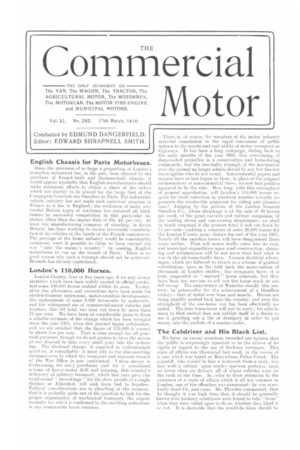London's 110,000 Horses.
Page 1

If you've noticed an error in this article please click here to report it so we can fix it.
London County, four or live years ago. if we may neeept statistic's a Inch have been widely quoted in official circles, had some 450,000 horses stabled within its area. To-dev, after due allowances and corrections have been made for electric-tramcar extensions, motor-omnibus developments, the replacement of some 6,000 horse-cabs: by motorcabs, and the widespread use of commercial-motor vehicles and tractors, this old total has ;Jeer' cut down by more than 75 per cent. We have been at considerable pains to form a. reliable estimate. of the change which has been wrought since the, year 1906, when this journal began publieation, and we are satisfied that the figure of 110,000 is correct to about five per cent. That is close enough for all practical purposes, though we de not profess to have the means at our disposal to take every small pony into the reckoning. The diselosed change, if expected in well-informed quart is. is remarkable: it must add to the disconverting circumstances by which thm transport and remount branch of the War Office is now confronted. Unless money is forthcoming for ear.y purchases and for a considered seheme of heavy-motor drill and training, this country's deficiency of military transport, which last year gave rise to all-rotund " borrowings " for the show parade of a single division at Aldershot, will sink from bad to hopeless. Politiea considerations are so absorbing at the moment. that it is probably quite out of the question to look for the proper organizatimi of mechanical transport, the urgent neces:sity for which is confirmed by the startling reductions in any comparable horse censuses.
There is, of course, for members of the motor industry material consolation in the rapid conversion of public opinion to the merits and real utility of motor transport on
highways. It has been a long campaign, dating hack to the early months of the year 1896, this overcoming of deep-rooted prejudice in a conservative and horse-loving eommunity, but the inevitable triumph of the mechanical over time animal no longer admits denial by any hot the few incorrigibles who do not count. Governmental papers and reports have at last begun to bless in place of the original concicinnatcwy or non-committal views, we now find positive approval to be the rule. How long, with this atmosphere of general approbation, will London's 1 l0,000 Itorses require for their reduction to whatever number actually represents the irreducible minimum for riding and pleasure uses? Judging by the policies of the London General Omnibus Co., whose shrinkage is at the rate of 60 horses per week, of the great carriers and railway companies, of the leading stores and van-owning 8 hopkeepers, we shall be mulch surprised if the present total is not cut down by 7.5 per cent—yielding a remnant of some 26,000 horses for the London County area—before the end of the year 1915. Nearly all the omnibus horses will have disappeared three years earlier. Then will motor traffic come into its own, and municipal expenditure upon road construction, cleansMg and maintenance will be not more than half what it n as in the all-horse-traffic days. Certain doubtful advantages, which are believed to attach to a. scheme of gradual substitution, have so far held back the. motorization of thousands of London stables; the occupants have, it is true, suspended or " starved " horse renewals, but they have been too nervous to sell out the horse stock at one fell swoop. The anniversary of Waterloo should, this century, be noteworthy for the achievement of a bloodless victory—that of metal over bone and muscle. Horses are being steadily pushed back into the country, and even the stronghold of the one-horse van has been effectually assailed. The true horse-lover will not be sorry; his attachment to that animal does not exhibit itself in a. desire. to see it grinding out a life of drudgery in order to put money into the pockets of a master-carter.
























